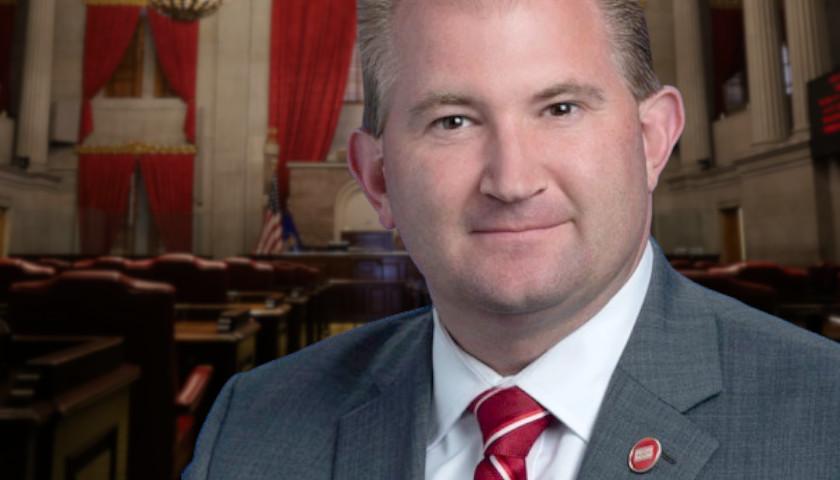I am not sure who coined the term “aha moment,” but this year at the 110th Tennessee General Assembly, many people I interact with on a regular basis have had such a moment. It is recognized that statewide we have some leaders who have stayed way too long and need to move on. The idea of a citizen-legislator has gone by the wayside and been replaced by the career politician.
Transformational leaders that care about the needs and interests of others are not normally career politicians. Rather, career politicians often place their own needs and re-election above those they serve. Someone described that transformation process this way: (1) A Sudden Awakening (2) Brutal Honesty (3) Immediate Action (Awakening, Honesty, Action = AHA).
If you are honest with yourself, you have discovered political labels really don’t matter much anymore. Dr. Larry Reed, president emeritus of the Mackinac Center for Public Policy, wrote: “I confess to a disillusionment with the commonly used political labels. Most have become excuses for people to stop thinking and instead, to simply pigeonhole others in a fashion that may be quick and convenient but is usually superficial and misleading.” Reed is absolutely correct. That is the awakening.
And more importantly, if you are honest, you must admit disappointment in many elected or appointed leaders at every level of government. It seems the focus of the angst I hear is now on the state level. I am certainly glad our organization is not in the endorsement or funding of candidates’ business.
Every day I see once idealistic people, who upon their election to political office, settling into the career politician mode. There are exceptions to the rules, of course. But it may be time for the state to consider term limits. America’s Founding Fathers included term limits in the Articles of Confederation, although they did not subsequently include such limits in the U.S. Constitution. In contrast to some of our “public servants” of today who manage to become quite wealthy while in office, Thomas Jefferson purposefully avoided such use of the public trust. Jefferson writing to his friend Count Diodati in 1807 penned “I have the consolation of having added nothing to my private fortune during my public service and of retiring with hands as clean as they are empty.”
A former colleague of mine, Carl Miller, in discussing the bureaucracy of a certain agency, said: “somebody needs to take a tanker full of GoLYTELY (which is used for bowel cleansing prior to colonoscopy), and flood it through this place.” While rather harsh, his suggestion has remained with me for almost two decades. There is part of me and many observers of state politics who would welcome a fresh direction in certain areas of state government, especially for a few committees at the Tennessee General Assembly. Unless there is more transparency and inclusion, there may well be a demand for change in leadership. For certain in 2019 there will be great change, and quite possibly the “drain the swamp” echo from 2016 will filter down to state politics in 2018.
Please note: I am not referring to the education committees whom we engage with the most, or the Tennessee Department of Education, whom I think are some of the best and brightest leaders in our state. We have found the vast majority of those leaders thoughtful and reasonable. However, I would suggest in the Tennessee House that they divide the two committees overseeing public education into K-12 and Higher Education, rather than the current format. It is common sense and needs to happen. We need to also quit rehashing rational for legislation in Finance Committees. No excuse for a bill to clear a committee, only to be killed in Finance by a suspect fiscal note and/or by people playing political games.
Attorney John Harris, writing in The Tennessee Star, was dead on in his description of “Fake Fiscal Notes.” Harris suggested studying “Fiscal Note determinations year to year” which makes it easy to detect the issue. His perception is stunningly accurate. All policymakers and education stakeholders should simply look at the fiscal note of similar bills such as SB 151-HB 294 in 2016, SB 1707-HB 2229 in 2016 in which the fiscal impact is listed as NOT SIGNIFICANT, then compare it to HB 356-SB 404 from 2017 which lists the fiscal impact as exceeding $100,000. The assumptions within the fiscal note are severely flawed. It is clear someone was playing politics with legislation. Since Krista Lee is the name listed on the bottom of the fiscal note of the Tennessee General Assembly Fiscal Review Committee, perhaps she may have some explaining to do in discussing how she derives her numbers, and why so many discrepancies with fiscal notes. Harris made a great recommendation when he wrote: “For the welfare of the citizens, the question may be whether the fiscal review process must be taken away from the Leadership in the Legislature and moved to a state agency that is specifically charged with fiduciary duty to generate fair, unbiased, non-manipulated, non-partisan fiscal projections.” There must be a better way, and the suggestion put forward by Harris should be considered.
There are lots of incredible leaders at the Tennessee General Assembly, many of whom I can disagree with on issues, yet deeply respect for their ability. There are some I would like to see seek higher office, many I would like to see in new leadership roles, and a few I would help pack.
When Steve Spurrier resigned as Coach of the South Carolina Gamecocks, he said: “I think the team needs to hear a new message, a new voice from another coach.” Simply put: we need new voices in our legislature, especially among leadership. There are too many talented members of the Tennessee General Assembly who could do so much more for the state if given an opportunity, and some who are in over their heads simply holding office. Those in over their heads remind me of what Laurence J. Peter, a prominent Canadian scholar of education, wrote: “In a hierarchy, every employee tends to rise to his level of incompetence.” That is what is referred to as the Peter Principle. And it affects every facet of our lives, including government.
You simply need to ask yourself one question: “is our government organized for the benefit of our citizens, or for the benefit of the legislators and political parties?” A “citizen legislature” of members who would likely be more closely in touch with the electorate is more preferable than a “professional legislature of career politicians.” Mary Anne Radmacher wrote: Courage doesn’t always roar. Sometimes courage is the quiet voice at the end of the day saying, ‘I will try again tomorrow.’” Sometimes courage means saying “I don’t like the direction of my government, and I am going to offer myself for public office and offer people another choice.”
I genuinely believe we will see more new people seeking political office in our state in 2018, and some significant turnover in the 111th Tennessee General Assembly. That will be the action part of the transformation process. One of my favorite quotes is: “It is very easy to see how many seeds are in an apple. You can cut open the apple and count the seeds. However, you never know how many apples lie within each seed.” You never know what is inside you until you push yourself! Then you will have your own Aha moment.
##
JC Bowman is the Executive Director of Professional Educators of Tennessee, a non-partisan teacher association headquartered in Nashville, Tennessee. Follow him on Twitter @jcbowman. Permission to reprint in whole or in part is hereby granted, provided that the author and the association are properly cited.






[…] By JC Bowman / Tennessee Star […]
This is an extremely stupid article, and has almost literally no point. “Drain the swamp” cool, got it. You state that you’ve held that sentiment for about two decades. I’m willing to bet out of 132 legislators I could count on my fingers the amount of legislators that have been in office twenty years. You just love saying we need to clean out the government because that’s a lazy way to vaguely criticize whatever is going on at the moment.